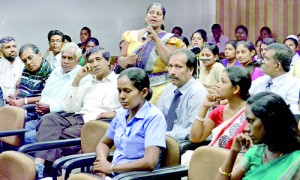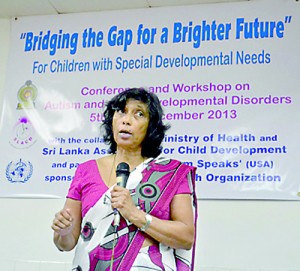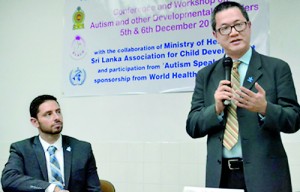News
Awareness day to sensitise people about Autism
The city of Colombo will turn blue on Wednesday (April 2) to show that Sri Lanka cares for those families striving to bring up a child affected by autism.
This is the colour which will twinkle on World Autism Awareness Day worldwide which Colombo city will don to shine a light of hope on the lives of these children.

A mother talks of the issues she faces
The light-up campaign is to be launched by First Lady Shiranthi Rajapaksa at the Town Hall. With posters displayed and leaflets distributed by the Sri Lanka Association for Child Development (SLACD), the aim is to sensitise people about autism, the Sunday Times understands.
There will also be a major campaign, facilitated by SLACD headed by Consultant Child Psychiatrist Prof. Hemamali Perera, to train healthcare workers in hospitals island-wide, detect such children and channel them for early screening and intervention. The training programmes are to be conducted by Consultant Paediatricians.
While the National Programme for children with special needs is to be launched in May by the Health Ministry, a research and training pilot project is currently being carried out for Medical Officers of Health (MOHs), midwives and pre-school teachers in six MOH areas in the Gampaha district, it is learnt.
The project funded by the World Health Organisation (WHO) is training this focus group to detect and send in children with special needs for early screening and intervention. It is being implemented by the Health Ministry and the know-how is being provided by SLACD.

Professor Hemamali Perera addressing the gathering. Pix by Hasitha Kulasekera
It had been mooted, the Sunday Times learns, at a meeting held by the WHO in October last year on the ‘Mental Health Gap Initiative’.
Meanwhile, a cross-section of views on how to deal with autism were garnered from a two-day Conference and Workshop on ‘Bridging the Gap for a Brighter Future’ held at the Lady Ridgeway Hospital for Children in Colombo in December last year.Focusing on children with special development needs, the conference and workshop were organised by SLACD in collaboration with the Health Ministry. Funded by the WHO, valuable input was provided by a two-member delegation from ‘Autism Speaks’ of the United States of America.
Inaugurated in the presence of the First Lady, the first day saw about 75 health and educational professionals involved in autism and other developmental disorders-related services exchanging views. The second day heard the opinions of representatives of parent associations and voluntary organisations.
Autism will be a component of the National Programme which includes screening for special developmental needs and care of these children, said Dr. Neil Thalagala of the Family Health Bureau.
All children are to be screened by primary healthcare workers supported by parents, at nine months, 18 months, three years and before entry to school. These primary healthcare workers would be armed with Child Health Development Records with the necessary indicators.

The team from ‘Autism Speaks’ addressing the gathering
Three hundred and thirty Primary Child Development Centres (PCDCs — one for an MOH area) are to be set up across the country with 40 Secondary Child Development Centres (SCDCs — one or two for a district), all under a Central Steering Body.
The SCDCs will be headed by a Development Paediatrician who will assess and send the children who require interventions back to the PCDCs which would be specialised centres.The outcome of the conference and workshop was a Road Map encompassing policy development, training and research, looking at a multi-pronged approach to tackling this issue.
Paediatricians, Child Psychiatrists and Community Physicians were involved in the conference and workshop, while ‘Autism Speaks’ was represented by Dr. Andy Shih and Michael Rosanoff.
| Political will neded to address issue
One in 93 children is affected by autism. With the annual live birth rate being 380,000, this means that more than 3,800 children would be affected by autism every year. |


